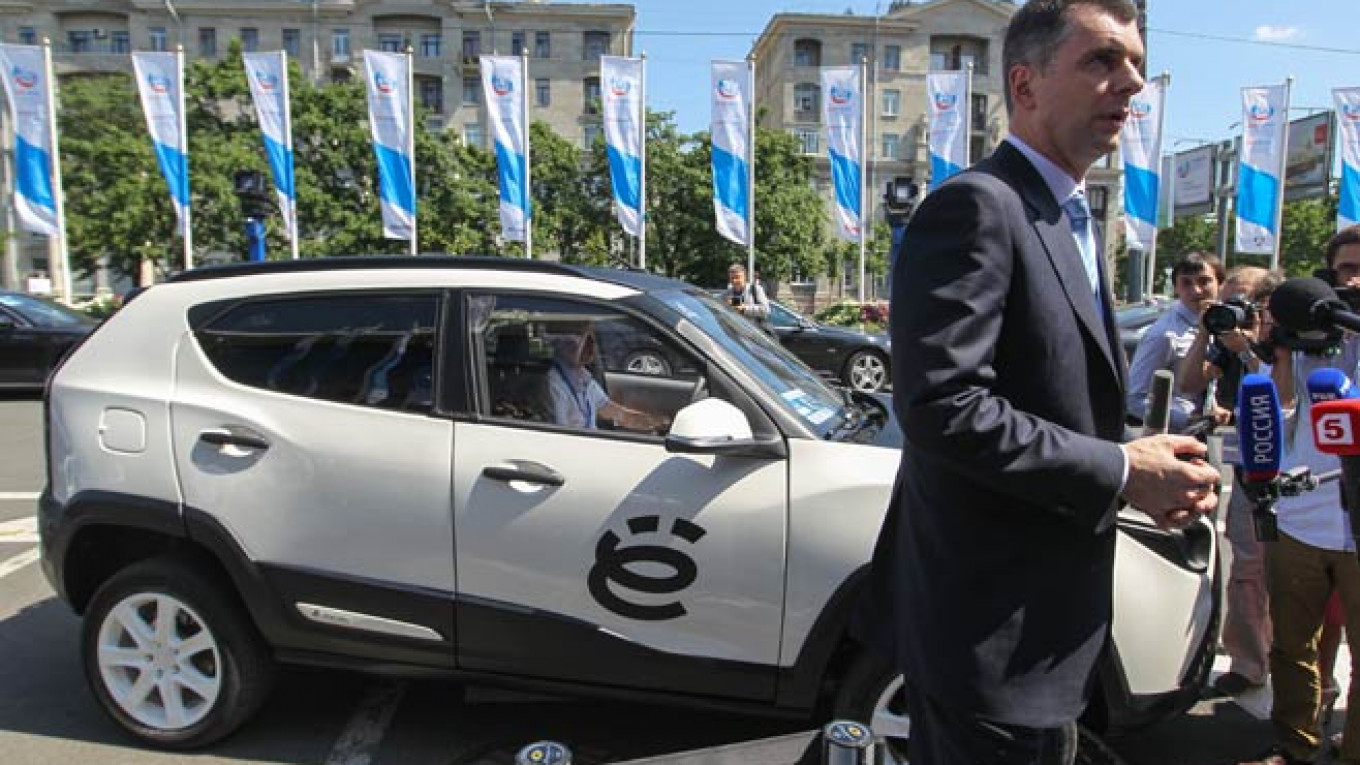Billionaire Mikhail Prokhorov has pulled out of a plan to build a hybrid car, whose test model he showed off to President Vladimir Putin, as the weakening of the ruble has pushed up costs.
Branded the Yo-Mobile, the gas-electric car would have been the first hybrid vehicle developed in Russia — and a stellar example of innovation. It has collected more than 210,000 pre-orders, but its production has repeatedly been delayed.
The rising cost of potential assembly would have undercut demand for the car, given the ongoing contraction of the automobile market, a statement from Prokhorov's investment company, Onexim, said Monday. Last year, Russia's car market shrank by 5 percent. Even so, the billionaire, who is also known for his ownership of the Brooklyn Nets basketball team and has a hefty stake in fertilizer producer Uralkali, refused to call the Yo-Mobile project a fiasco.
"We did achieve a result — and it is a 100 percent success," his spokeswoman Tatyana Kosobokova said by phone. "Unique technology has been developed, and it is staying in Russia."
Onexim sold the technology, which it developed for the project, to the state-owned Central Automotive Research Institute for a token price of 1 euro ($1.4) in a deal signed last week.
The institute could use the information for "a number of innovative projects," said its spokesman Andrei Garmai, without elaborating.
A number of Asian and Western companies have hankered after the technology developed for the Yo-Mobile, but have been rebuffed by Onexim, Kosobokova said.
Kosobokova did not say how much Onexim spent on the car's development and the construction of a plant in St. Petersburg, which was set for completion later this year. But she said the company could have recouped the investment if it had sold its engineering solutions for the car to one of the suitors.
Named so after the Russian letter Yo, which resembles a latin e with an umlaut, the vehicle once looked like it had the blessing of one of the world's most powerful motorists. In April 2011, then-Prime Minister Putin took a ride in one of the first prototypes of the Yo-Mobile, after asking Prokhorov if it was not likely to fall apart. Putin drove the car from his Novo-Ogaryovo residence outside Moscow to then-President Dmitry Medvedev's official countryside home in Gorky-9 to attend a Security Council meeting.
The 2.03-meter-tall Prokhorov, who usually uses a more spacious Mercedes to get around, followed in another Yo-Mobile.
Prokhorov squeezed himself into a Yo-Mobile prototype again at last year's St. Petersburg's International Economic Forum in an apparent effort to send the message that the car project was moving forward, despite several delays.
Prokhorov said later that year that Yo-Avto, a joint venture controlled by Onexim, would begin mass production in 2015.
But in February, the chief of the department for industrial policy at St. Petersburg's City Hall, Maxim Meiskin, said the project was on hold indefinitely.
First devised in 2010, the car was initially to start rolling off the assembly line in 2012, but repeatedly ran into engineering and component supply hurdles. Yarovit Motors, a little-known truck maker, was Onexim's partner in the project.
The car was to sell for no more than 450,000 rubles ($12,500), but Onexim said Monday the price would "inevitably" rise because the dwindling value of the ruble was driving up the cost of required investment — a likely reference to the heavy reliance on foreign developers of components for the car.
Competition in the low-cost segment is on the rise. Renault-Nissan Alliance president Carlos Ghosn last week presented the Datsun for the Russian market, a sedan aimed at people who cannot afford to spend more than 400,000 rubles on a car.
Prokhorov is leaving behind the Yo-Mobile idea, but he is intent on keeping one promise he made when he tried, about two years ago, to dispel doubts that his plan would work. He gave his word at the time that ultranationalist political leader Vladimir Zhirinovsky, one of the skeptics, would once be able to drive a Yo-Mobile.
The car is now undergoing testing for certificates, and will be ready to be handed over to him in the fall, Kosobokova said.
A Zhirinovsky spokesman, Yury Ryzhov, said, "We will be waiting."
Contact the author at [email protected]
A Message from The Moscow Times:
Dear readers,
We are facing unprecedented challenges. Russia's Prosecutor General's Office has designated The Moscow Times as an "undesirable" organization, criminalizing our work and putting our staff at risk of prosecution. This follows our earlier unjust labeling as a "foreign agent."
These actions are direct attempts to silence independent journalism in Russia. The authorities claim our work "discredits the decisions of the Russian leadership." We see things differently: we strive to provide accurate, unbiased reporting on Russia.
We, the journalists of The Moscow Times, refuse to be silenced. But to continue our work, we need your help.
Your support, no matter how small, makes a world of difference. If you can, please support us monthly starting from just $2. It's quick to set up, and every contribution makes a significant impact.
By supporting The Moscow Times, you're defending open, independent journalism in the face of repression. Thank you for standing with us.
Remind me later.






